#Arbaces king
Explore tagged Tumblr posts
Text
June 29, 2021
Verse: Nehemiah 11-13 Write/ Copy Gods words :
The New Residents of Jerusalem 11:3–19pp—1Ch 9:1–17 11 Now the leaders of the people settled in Jerusalem. The rest of the people cast lots to bring one out of every ten of them to live in Jerusalem,k the holy city,l while the remaining nine were to stay in their own towns.m 2 The people commended all who volunteered to live in Jerusalem. 3 These are the provincial leaders who settled in Jerusalem (now some Israelites, priests, Levites, temple servants and descendants of Solomon’s servants lived in the towns of Judah, each on their own property in the various towns,n 4 while other people from both Judah and Benjamino lived in Jerusalem):p From the descendants of Judah: Athaiah son of Uzziah, the son of Zechariah, the son of Amariah, the son of Shephatiah, the son of Mahalalel, a descendant of Perez; 5 and Maaseiah son of Baruch, the son of Kol-Hozeh, the son of Hazaiah, the son of Adaiah, the son of Joiarib, the son of Zechariah, a descendant of Shelah. 6 The descendants of Perez who lived in Jerusalem totaled 468 men of standing. 7 From the descendants of Benjamin: Sallu son of Meshullam, the son of Joed, the son of Pedaiah, the son of Kolaiah, the son of Maaseiah, the son of Ithiel, the son of Jeshaiah, 8 and his followers, Gabbai and Sallai—928 men. 9 Joel son of Zikri was their chief officer, and Judah son of Hassenuah was over the New Quarter of the city. 10 From the priests: Jedaiah; the son of Joiarib; Jakin; 11 Seraiahq son of Hilkiah, the son of Meshullam, the son of Zadok, the son of Meraioth, the son of Ahitub,r the official in charge of the house of God, 12 and their associates, who carried on work for the temple—822 men; Adaiah son of Jeroham, the son of Pelaliah, the son of Amzi, the son of Zechariah, the son of Pashhur, the son of Malkijah, 13 and his associates, who were heads of families—242 men; Amashsai son of Azarel, the son of Ahzai, the son of Meshillemoth, the son of Immer, 14 and hisa associates, who were men of standing—128. Their chief officer was Zabdiel son of Haggedolim. 15 From the Levites: Shemaiah son of Hasshub, the son of Azrikam, the son of Hashabiah, the son of Bunni; 16 Shabbethais and Jozabad,t two of the heads of the Levites, who had charge of the outside work of the house of God; 17 Mattaniahu son of Mika, the son of Zabdi, the son of Asaph,v the director who led in thanksgiving and prayer; Bakbukiah, second among his associates; and Abda son of Shammua, the son of Galal, the son of Jeduthun.w 18 The Levites in the holy cityx totaled 284. 19 The gatekeepers: Akkub, Talmon and their associates, who kept watch at the gates—172 men. 20 The rest of the Israelites, with the priests and Levites, were in all the towns of Judah, each on their ancestral property. 21 The temple servantsy lived on the hill of Ophel, and Ziha and Gishpa were in charge of them. 22 The chief officer of the Levites in Jerusalem was Uzzi son of Bani, the son of Hashabiah, the son of Mattaniah,z the son of Mika. Uzzi was one of Asaph’s descendants, who were the musicians responsible for the service of the house of God. 23 The musiciansa were under the king’s orders, which regulated their daily activity. 24 Pethahiah son of Meshezabel, one of the descendants of Zerahb son of Judah, was the king’s agent in all affairs relating to the people. 25 As for the villages with their fields, some of the people of Judah lived in Kiriath Arbac and its surrounding settlements, in Dibond and its settlements, in Jekabzeel and its villages, 26 in Jeshua, in Moladah,e in Beth Pelet,f 27 in Hazar Shual,g in Beershebah and its settlements, 28 in Ziklag,i in Mekonah and its settlements, 29 in En Rimmon, in Zorah,j in Jarmuth,k 30 Zanoah,l Adullamm and their villages, in Lachishn and its fields, and in Azekaho and its settlements. So they were living all the way from Beershebap to the Valley of Hinnom. 31 The descendants of the Benjamites from Gebaq lived in Mikmash,r Aija, Bethels and its settlements, 32 in Anathoth,t Nobu and Ananiah, 33 in Hazor,v Ramahw and Gittaim,x 34 in Hadid, Zeboimy and Neballat, 35 in Lod and Ono,z and in Ge Harashim. 36 Some of the divisions of the Levites of Judah settled in Benjamin. Priests and Levites 12 These were the priestsa and Levitesb who returned with Zerubbabelc son of Shealtield and with Joshua:e Seraiah,f Jeremiah, Ezra, 2 Amariah, Malluk, Hattush, 3 Shekaniah, Rehum, Meremoth, 4 Iddo,g Ginnethon,a Abijah,h 5 Mijamin,b Moadiah, Bilgah, 6 Shemaiah, Joiarib, Jedaiah,i 7 Sallu, Amok, Hilkiah and Jedaiah. These were the leaders of the priests and their associates in the days of Joshua. 8 The Levites were Jeshua,j Binnui, Kadmiel, Sherebiah, Judah, and also Mattaniah,k who, together with his associates, was in charge of the songs of thanksgiving. 9 Bakbukiah and Unni, their associates, stood opposite them in the services. 10 Joshua was the father of Joiakim, Joiakim the father of Eliashib,l Eliashib the father of Joiada, 11 Joiada the father of Jonathan, and Jonathan the father of Jaddua. 12 In the days of Joiakim, these were the heads of the priestly families: of Seraiah’s family, Meraiah; of Jeremiah’s, Hananiah; 13 of Ezra’s, Meshullam; of Amariah’s, Jehohanan; 14 of Malluk’s, Jonathan; of Shekaniah’s,c Joseph; 15 of Harim’s, Adna; of Meremoth’s,d Helkai; 16 of Iddo’s,m Zechariah; of Ginnethon’s, Meshullam; 17 of Abijah’s,n Zikri; of Miniamin’s and of Moadiah’s, Piltai; 18 of Bilgah’s, Shammua; of Shemaiah’s, Jehonathan; 19 of Joiarib’s, Mattenai; of Jedaiah’s, Uzzi; 20 of Sallu’s, Kallai; of Amok’s, Eber; 21 of Hilkiah’s, Hashabiah; of Jedaiah’s, Nethanel. 22 The family heads of the Levites in the days of Eliashib, Joiada, Johanan and Jaddua, as well as those of the priests, were recorded in the reign of Darius the Persian. 23 The family heads among the descendants of Levi up to the time of Johanan son of Eliashib were recorded in the book of the annals. 24 And the leaders of the Leviteso were Hashabiah, Sherebiah, Jeshua son of Kadmiel, and their associates, who stood opposite them to give praise and thanksgiving, one section responding to the other, as prescribed by David the man of God.p 25 Mattaniah, Bakbukiah, Obadiah, Meshullam, Talmon and Akkub were gatekeepers who guarded the storerooms at the gates. 26 They served in the days of Joiakim son of Joshua, the son of Jozadak, and in the days of Nehemiah the governor and of Ezra the priest, the teacher of the Law. Dedication of the Wall of Jerusalem 27 At the dedicationq of the wall of Jerusalem, the Levites were sought out from where they lived and were brought to Jerusalem to celebrate joyfully the dedication with songs of thanksgiving and with the music of cymbals,r harps and lyres.s 28 The musicians also were brought together from the region around Jerusalem—from the villages of the Netophathites,t 29 from Beth Gilgal, and from the area of Geba and Azmaveth, for the musicians had built villages for themselves around Jerusalem. 30 When the priests and Levites had purified themselves ceremonially, they purified the people,u the gates and the wall. 31 I had the leaders of Judah go up on top ofe the wall. I also assigned two large choirs to give thanks. One was to proceed on top off the wall to the right, toward the Dung Gate.v 32 Hoshaiah and half the leaders of Judah followed them, 33 along with Azariah, Ezra, Meshullam, 34 Judah, Benjamin,w Shemaiah, Jeremiah, 35 as well as some priests with trumpets,x and also Zechariah son of Jonathan, the son of Shemaiah, the son of Mattaniah, the son of Micaiah, the son of Zakkur, the son of Asaph, 36 and his associates—Shemaiah, Azarel, Milalai, Gilalai, Maai, Nethanel, Judah and Hanani—with musical instrumentsy prescribed by David the man of God.z Ezraa the teacher of the Law led the procession. 37 At the Fountain Gateb they continued directly up the steps of the City of David on the ascent to the wall and passed above the site of David’s palace to the Water Gatec on the east. 38 The second choir proceeded in the opposite direction. I followed them on top ofg the wall, together with half the people—past the Tower of the Ovensd to the Broad Wall,e 39 over the Gate of Ephraim,f the Jeshanahh Gate,g the Fish Gate,h the Tower of Hananeli and the Tower of the Hundred,j as far as the Sheep Gate.k At the Gate of the Guard they stopped. 40 The two choirs that gave thanks then took their places in the house of God; so did I, together with half the officials, 41 as well as the priests—Eliakim, Maaseiah, Miniamin, Micaiah, Elioenai, Zechariah and Hananiah with their trumpets—42 and also Maaseiah, Shemaiah, Eleazar, Uzzi, Jehohanan, Malkijah, Elam and Ezer. The choirs sang under the direction of Jezrahiah. 43 And on that day they offered great sacrifices, rejoicing because God had given them great joy. The women and children also rejoiced. The sound of rejoicing in Jerusalem could be heard far away. 44 At that time men were appointed to be in charge of the storeroomsl for the contributions, firstfruits and tithes.m From the fields around the towns they were to bring into the storerooms the portions required by the Law for the priests and the Levites, for Judah was pleased with the ministering priests and Levites.n 45 They performed the service of their God and the service of purification, as did also the musicians and gatekeepers, according to the commands of Davido and his son Solomon.p 46 For long ago, in the days of David and Asaph,q there had been directors for the musicians and for the songs of praiser and thanksgiving to God. 47 So in the days of Zerubbabel and of Nehemiah, all Israel contributed the daily portions for the musicians and the gatekeepers. They also set aside the portion for the other Levites, and the Levites set aside the portion for the descendants of Aaron.s Nehemiah’s Final Reforms 13 On that day the Book of Moses was read aloud in the hearing of the people and there it was found written that no Ammonite or Moabite should ever be admitted into the assembly of God,t 2 because they had not met the …
What is your favourite verse or verses? 13.along with 242 of his associates, who were heads of their families. Also Amashsai son of Azarel, son of Ahzai, son of Meshillemoth, son of Immer,
Explain in your own words what you just read:
It wasn’t enough to see the city walls rebuilt and the spiritual renewal of the people of Jerusalem; now they concerned themselves with getting more people into the city.
Commitment / what will i do : I will knew the bigger the population of Jerusalem, the greater the resources for defense and strength in battle
0 notes
Text
Somewhat related: Arbace in Metastasio's Artaserse* refusing to explain himself yet begging to be understood.
*murder mystery: Arbace is accused of regicide but insists on his innocence, at the same time refusing to explain why he was trying to flee the king's garden with a bloody sword.
Unfinished thought from the bookclub voice call.
We were talking about how Lucan speaks in circles (cyclical washing machine time of the Pharsalia) around the "unspeakable" (nefas, civil war, trauma) at the circle's center, unreacheable.
It reminded me of opera seria arias that go like "I dare not speak, but I have not the strength to stay silent" (a popular motif, e.g. "tutto spiegar non oso, tutto non so tacer"; or as another example, the second stanza of Tremo fra' dubbi miei, Vitellia's aria from Gluck's Clemenza).
To add the context, the arias of the genre that I am talking about are
"a picture of the feeling soul";
static as a "moment out of the flow of narrative time";
in some way addressed directly to the audience;
rhetorical by intention and structure;
often arranged around a "Catullan" contradiction of conflicting impulses;
circular (da capo).
12 notes
·
View notes
Text
Idomeneo (Met, 2017): Reactions, Part III
let’s finish this up @monotonous-minutia

...you okay there???
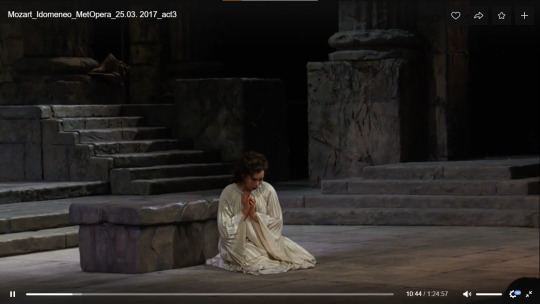
she’s simply magical and this is gorg
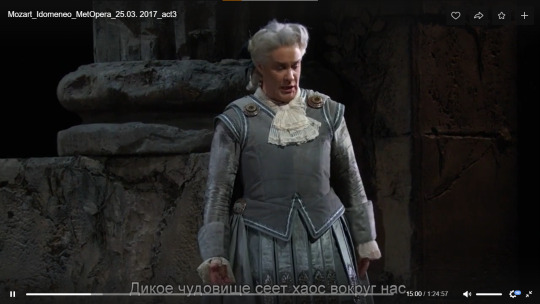
SOMEONE HELP HIM
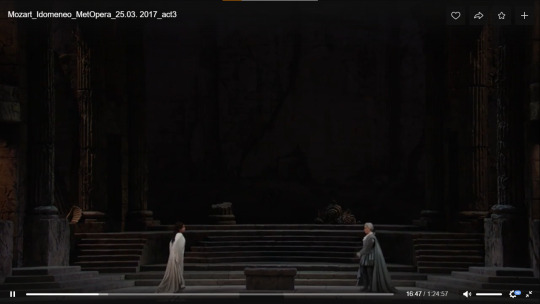
AT LAST

PROTECT THEM
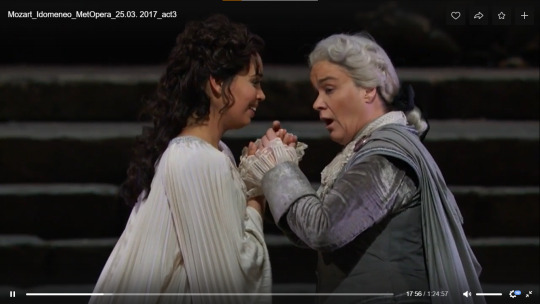
they’re just so cute and iconic
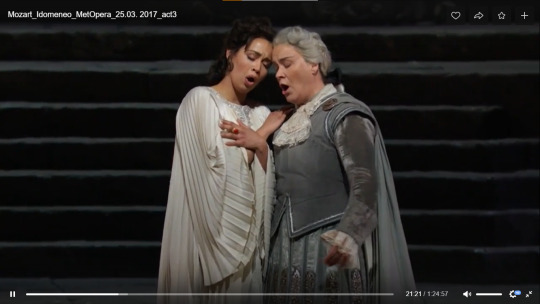
pair the cinnamon rolls :)
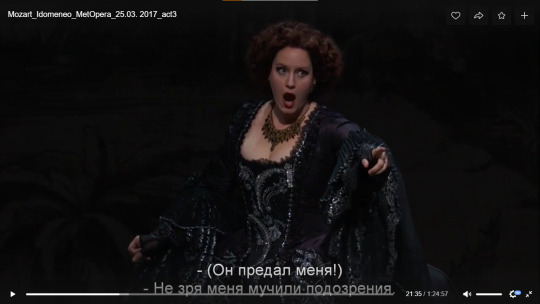
well this is awkward
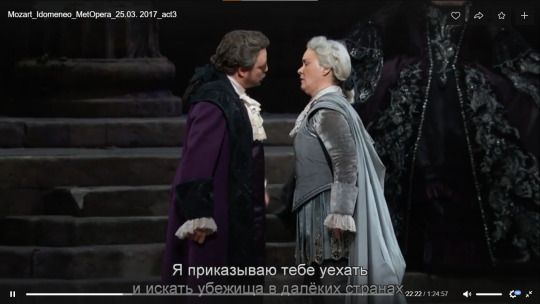
oh this HURTS

rude
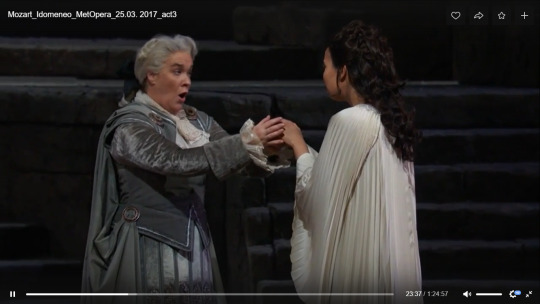
agggggggggggggggggh
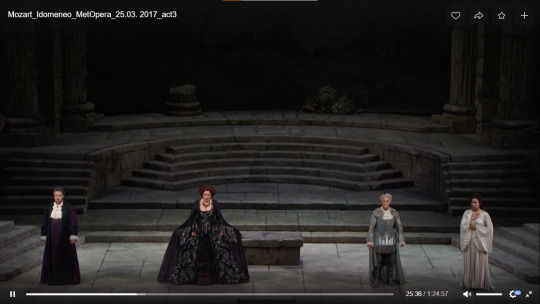
dream team, one night only, no encores

“aight too painful imma head out”

Arbace you’re still not helping

someone’s pissed also I want the High Priest’s outfit

that is a CHILD

thank you for being the only tenor in this opera with any common sense whatsoever
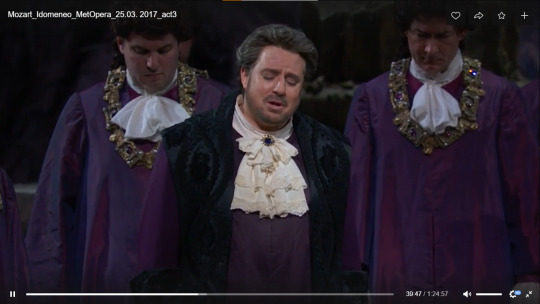
“everyone...I have fucked up”

“uh, YEAH. YOU DID.”

really, a phenomenal chorus (both the piece itself and the Met chorus, which is always fabulous)
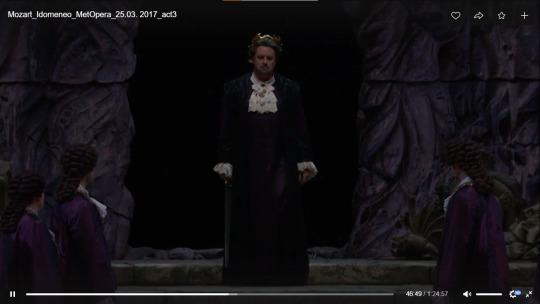
oh this music is lovely
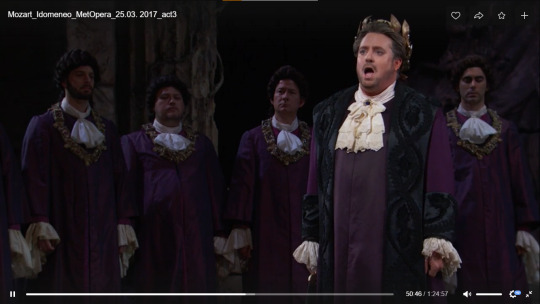
Matthew is just *chef’s kiss*
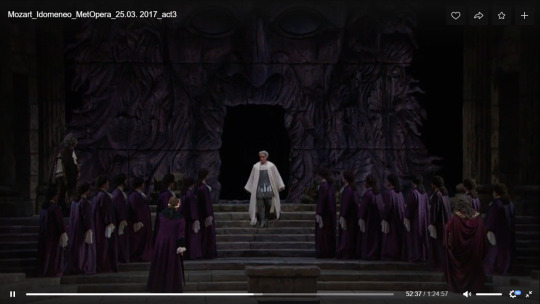
at least someone is actually effective
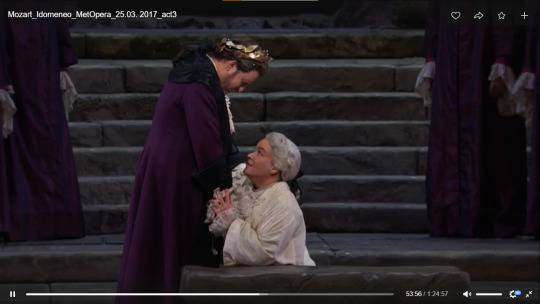
*cries*
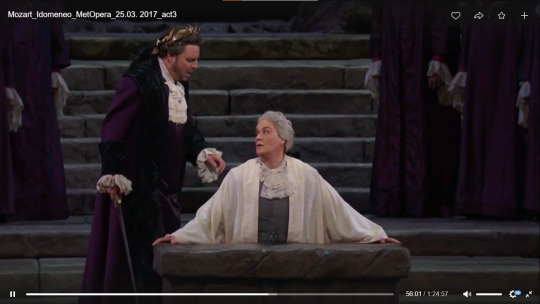
BUDDY
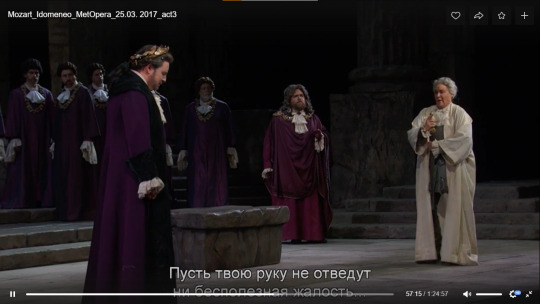
IDAMANTE IS SO WHOLESOME AND HE DESERVES BETTER
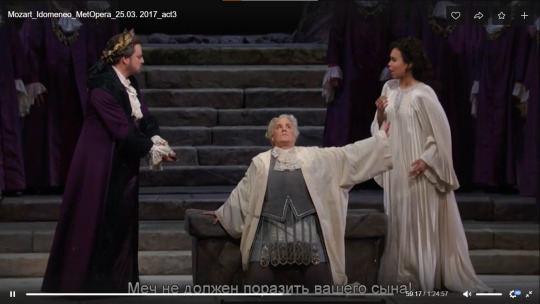
THANK YOU ILIA

...but don’t do that

COOL EFFECT

Eric Owens...indeed the voice of a god

I love how Neptune’s just like “dude you fucked up too much stuff to still be king so let’s put in your son who’s actually good at this”
like, that isn’t actually what he said but...yeah
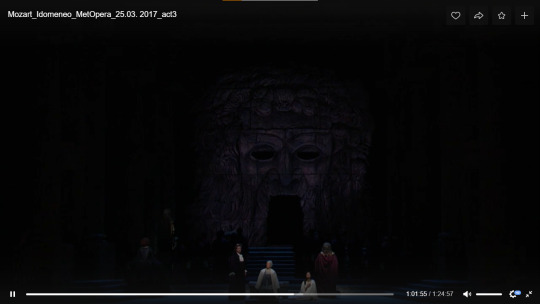
deus ex machina, like any proper opera seria

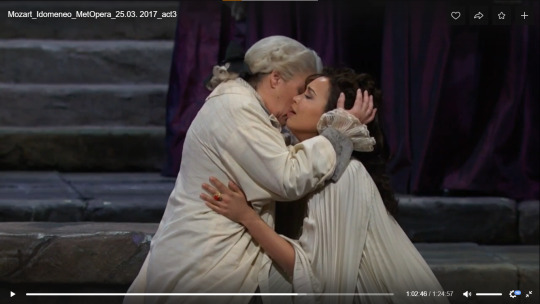
feelings are...varied

such a diva and I love it
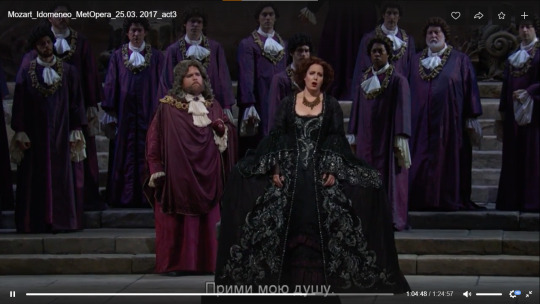
everyone is traumatized
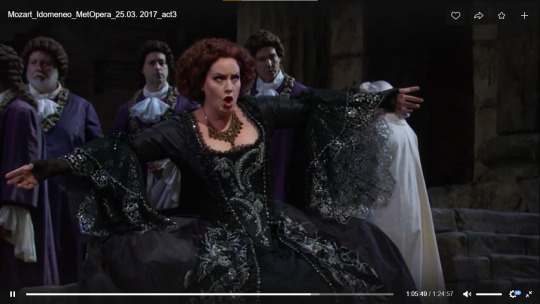
I FUCKING LOVE THIS ARIA
(it’s like the one thing from this opera I’ve listened to with any regularity, although that will be changing in light of this)

and she killed it! (and also apparently herself in the process because she just. flops down and dies.)

and now it’s time to move on
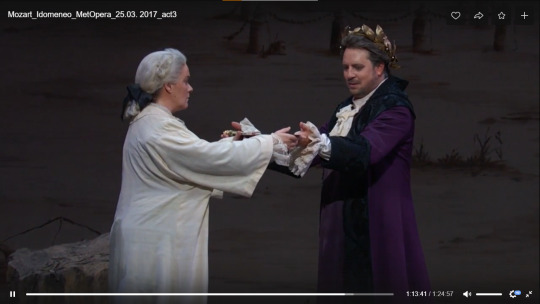
hooray!!!
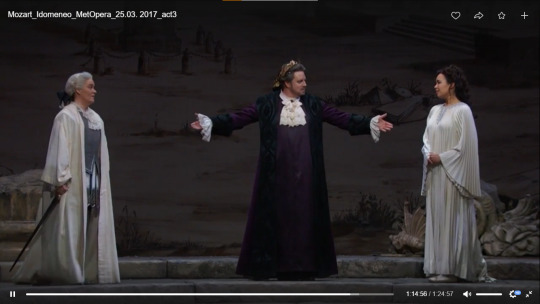
operatic royalty

wuv twue wuv
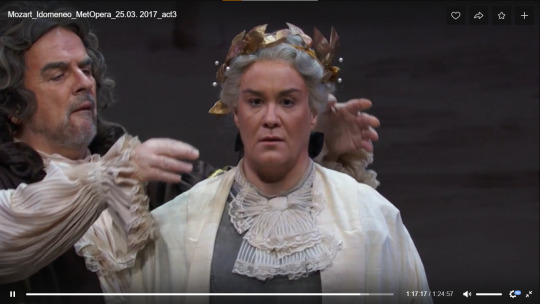
all hail the TRUE king

FINALLY
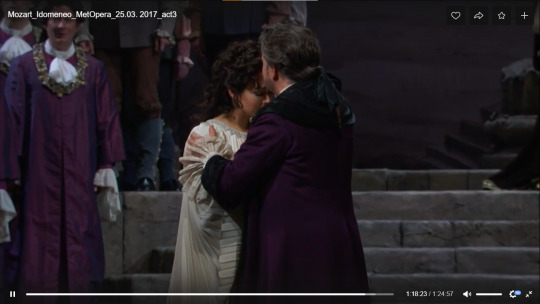
adorable
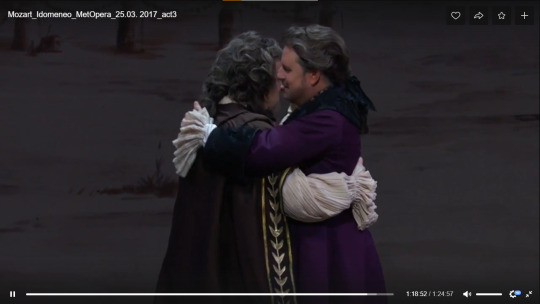
go be ineffectual and gay together please <3
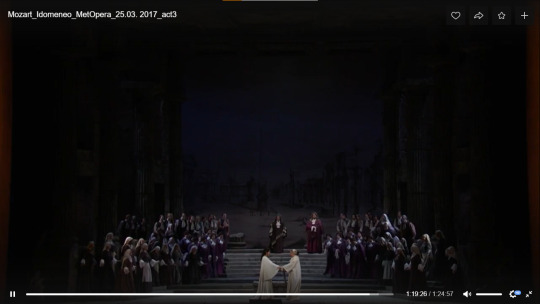
time to love and heal and move forward <3
anyway this was FANTASTIC
#opera#opera tag#opera liveblog#Idomeneo#Mozart#Wolfgang Amadeus Mozart#y'all I forgot how this opera HITS DIFFERENT
13 notes
·
View notes
Note
same rules as last time, another topic.
Taking advantage of this one to ramble a little on something that’s been on my mind since I saw the ending of the 2006 Salzburg Idomeneo. Pardon my lit crit nerdiness. Also TW for discussions of mental illness and suicidal ideation (in the context of the opera).
Under the line because it got really long…if only I could find this much motivation for my philosophy papers.
At the end of this production, during the ballet music written to represent Idamante’s coronation, they used it as an opportunity to give us some adorable flirting with Idamante and Ilia after the big final chorus and everyone being happy and relieved. I loved that; this opera is so full of angst we don’t get much calm or sweetness aside from Ilia’s aria at the top of Act III (which is still kinda angsty) and the following duet with Idamante. So it was nice to see them finally relaxed and able to enjoy each other’s company without the looming crisis and heavy amounts of despair.
But then at the very very end we get this moment where they both come to an abrupt pause when Idamante sees the ax his father was going to use to kill him with for the sacrifice. Because Idomeneo is the epitome of Useless Tenor, he decided to just leave it lying around.
Idamante just stops in his tracks and stares at it. Ilia sees it too and then she immediately looks at Idamante to see his reaction, and he stares back at her for a minute. They both start to back away and Idamante looks back at the ax and puts his hands to his neck.
First time around this blindsided me and I started freaking out because I thought maybe someone was going to do something with the ax after all—both Elettra and Idomeneo were wandering around in the background at this point so there was a lot of possibility. Or maybe even Neptune. He did give Elettra a dagger, after all, presumably to encourage her to use it on herself. (Arbace in that moment proved himself to be the only tenor with half a brain cell and took it away from her.)
Thankfully nothing along those lines happened, but I was angry that the directors made my mind go there and upset that we couldn’t just give Idamante and Ilia the peaceful happy ending they so deserve by this point.
But the more I thought of it, I started to respect the decision to put that part in there. It does something that none of the other productions I’ve seen have done—it gives us a vivid look into Idamante’s mind in terms of his trauma, which would very likely occur after such a dramatic series of events. And it got me thinking.
Idamante is very clearly depressed in this piece. Pretty much every opera character ever talks frequently about their emotional pain and grief, but basically 50% of Idamante’s lines are about how sad he is about pretty much everything. Almost every time he exits the stage directions say he does so “sadly” or “in despair.” He talks about wandering aimlessly until he dies, seeing no purpose in his life.
He does have moment of happiness—when he thinks his father is coming home, when he finds out he’s alive, when he finds out Ilia loves him, and even when he realizes he’s going to have to die to save his people. But the first experience we have of Idamante is basically him telling Ilia that he wants to die. This is a sentiment he makes more than once throughout the course of the opera.
In the beginning, he’s celebrating the end of the war and the fact that he can free the prisoners, and his father will be coming home soon. But he’s distracted by the fact that he’s in love with Ilia—whom he does not know loves him in return, because she hates his people on principle for being the enemies of her family (not that we can really blame her for that). She’s reluctant to show feelings for him. As we will learn, Idamante (following operatic convention) perceives the world in extremes; she’s cold towards him which makes him think she hates him. The war is over, his people are at peace, he’s making the executive decision to set the prisoners free so they can live in harmony with his people. Despite all this, he’s distracted by the despair he feels about his relationship (or lack thereof) with Ilia. A depressed mind can’t always find enough comfort in the good stuff to use it as motivation. And she apparently wants him dead. Being a people-pleaser, he offers to let that happen. He just wants to hear her ask it herself. Possibly because he secretly thinks she’s too nice to actually ask that. And if she’s in a place that she would, or even kill him herself, he’s in trouble anyway, so why stick around?
I’m not saying this is solid logic; it’s opera logic.
The second time he says he wants to die is right before his love duet with Ilia. By this point he’s been rejected by his father multiple times and he still thinks Ilia hates him. His people don’t need him, because the king has returned, and aside form that he’s being sent away anyway. He just found out there’s a terrible monster (which gets no other description) running around destroying things and Idomeneo isn’t doing anything about it. So he plans on going after it himself and notes that even if he does mange to kill it, he’s probably going to die in the process, and he’s okay with that because he feels no hope in his life.
Ilia finally tells him she doesn’t want him to die because she actually does love him. Don’t ask me why it took her so long to say this when she’d already asked Idomeneo to basically adopt her an entire act earlier.
Idamante finally feels like he has something to live for. His father might hate him, his kingdom may not need him, but if Ilia wants to be a part of his life, he has a purpose again. This joy does not last very long, though. Idomeneo, who seems to have a habit of coming when he’s not needed and staying away when he is, shows up and interrupts their duet so abruptly that every time the track ends on my mezzo playlist I get whiplash. Idomeneo is upset that Ilia loves Idamante, because that’s just one more person that’s going to be hurt when he sacrifices Idamante. Once again, however, he refrains from telling people what the heck is actually going on, preferring to leave them in the dark, which, if he paid any attention, makes people much more miserable than the truth would. So all Idamante hears is that not only does his father inexplicably hate him, he’s also forbidding him to be with the person he’s in love with.
By now Idamante’s basically experienced the full gamut. He’s been in and out of love with Elettra; he’s suffered the thought that Ilia hates him; he’s faced the joy of finding out that’s not the case; he’s been through the roller coaster of first thinking that his dad is finally coming home after then ten-year war, then despairing at his death, then a few hours later finding out he’s actually alive, only to have his father reject him upon their first reunion and several times after. Further, he just found out (or thinks he’s found out, because Idomeneo is terrible at describing things) that it’s his fault the gods are punishing his people and that this terrible monster is ravaging the city. Now his father is asking him to leave and never return. Idamante says that he’ll do that to please his father, but he’s probably just going to die along the way, and that truthfully that’s what he wants to happen at this point.
The only thing that finally makes Idamante happy is when he finds out that his father has to kill him. His joy is twofold. One, he finally knows why his father has been such a dick to him. Precious sunflower that he is, he thinks it’s totally okay that his father treated him that way because it was apparently out of love. Because repeatedly being rejected isn’t as bad when the person doing the rejecting is doing it because they don’t want to kill you. Even though said rejecting hurt worse than death and almost led to your death anyway. That’s the excuse Idomeneo has. Idamante is not only a victim of the gods, but of one of the most extreme cases of Disastrous Tenor Logic ever seen in opera.
The second part of his joy comes from the realization that he has the ability to save his people. He just managed to kill the terrible monster miraculously without dying, but he only saved himself because he found out his father needs to kill him. And now he’s bursting with joy because he can help his father gain peace of mind and protect his kingdom from the wrath of the gods. He spends the next several minutes forgiving Idomeneo for being an asshole and comforting him, despite the fact that he’s the one that’s going to die. The only value he sees in his life at this moment is the fact that it’s going to end.
If it weren’t for Ilia, who knows if Idamante would have survived, because Neptune sure took his time to intervene. But even after the love of his life rescues him, Idamante still wants to die. He finally has what he wants—the love of his father and the love of Ilia—but he’s still prepared to die because by this point he sees it as his destiny. Once again it falls on him to do the comforting. He tries to convince Ilia to let go, be happy, and let him die in peace. There is very little indication from Idamante that he’s sad about losing his life for its own sake. Only for the way it’s going to affect others.
People who are suicidal tend to think that the world would be a better place without them. Here that is literally the case: the chaos will only cease when Idamante is dead. So not only does Idamante spend the majority of this opera feeling hopeless and wanting to die because of that, he finds out that by dying he’s going to be more useful to the living than if he himself were to continue to live. The inaccurate assumption that the world is better off without him, brought on by his depression, has suddenly become reality. They couldn’t have chosen a better victim.
Then Neptune saves him and announces Idamante will be king (because it’s finally clicked that Idomeneo is doing a shit job) and that he’ll marry Ilia. Suddenly his life has purpose again. Suddenly, it’s not his death that would make people happy; it’s his life.
It’s opera seria so we want a happy ending, and usually we get a happy ending. Not so much with this production, though. The way these directors ended their Clemenza wasn’t my favorite—not nearly enough hugging—but it wasn’t specifically taking a step in a darker direction. It left us with some suspended angst, knowing it’s not possible, after the events of the opera, for things to go back to the way they were before, when people were happy.
This one, though, took things further. As described earlier, we get this eerie moment of Idamante stopping in his tracks and staring at the weapon that almost killed him. No one uses the ax. No one’s touching it. But the sight of it is enough to send him to a dark place.
At this point Idamante has faced, in a remarkably short amount of time, joy, despair, depression, elation, self-loathing, self-worth, suicidal ideation, and the desire to live. He’s basically felt the full spectrum of human emotion. And he’s faced death twice in the span of maybe an hour: at the hands of the terrible monster, and at the hands of his own father.
He was completely willing to lay down his life for the greater good, but an honorable death is still dying. Right now he’s dancing around with Ilia, celebrating life and love and joy, and then in an instant he’s faced with the memory of the fact that he almost died. Now that he has the ability to appreciate life, that concept is terrifying.
Before watching this moment, it had weirdly never occurred to me the lifelong impact that this series of events would have on Idamante. But looking back it seems kind of obvious that it would. In opera we’re used to people just dying, not getting rescued at the last minute. In most productions, Idomeneo is poised to make the final blow before Ilia intervenes. Idamante is certain these are his last seconds on earth, but suddenly the aren’t. He’s given a second chance to live again, but he’s still left with that feeling. That he was going to die. That his father was going to kill him.
So as much as I want them to just have a happy, carefree ending, that’s not realistic. As the Paris Clemenza pointed out, there’s no way things can go back to the way they were before. Idamante is king now (though he’s probably used to that, having basically run the place in his father’s absence anyway). He finally has Ilia’s love and permission to marry her. He finally has his father back, both physically (he’s here) and emotionally (he’s finally being nice again). His people are safe and will be protected. The war is over. The people are united. But the price of this was days (maybe weeks, depending on how the time span is portrayed) of despair, of the wish to die, and finally a near-death experience. This is a recipe for trauma. On the outside his life is now perfect; he has everything he wants. But the mental and emotional backlash is going to be brutal.
All this is to say…after thinking about it in this way, I actually really appreciate that the directors put this in. Yeah, I wish the opera could end on a happy note with some cute flirting and cuddles. But that would be minimizing the significance of the trauma for Idamante. I’ve always appreciated this opera for the way it emphasizes the intense emotions felt by Idamante (and the others, but mostly this kid) which are almost a commentary on mental illness. In some ways it shows us the same ultimatum we see in so many operas: love or death. “If I can’t have this person as my love, my only peace is in the grave.” How many times have we heard that (or some variant) coming from the mouths of operatic protagonists (and sometimes villains)? But this opera has always hit a little different for me. Maybe it’s because of how many times Idamante expresses this feeling, in various contexts. Maybe it’s because of the multiple facets of his life that impact his feelings. Or the complex web of relationships that add their own influence. Or the fact that he’s not making these comments to himself, as we see much of the time in opera, but flat-out stating them to the people in his life who have the power to make him feel better and literally save his life, but who for the longest time refuse to do so.
The ending of this production validates all of that by reminding us that Idamante’s problems are not easily swept away by the proclamations of a god. They’re still very real and very much a part of his life, and will be for some time—maybe forever.
He’s traumatized. Seeing the ax again triggered that trauma, and he’s left with the haunting truth that this trauma may never go away.
It’s honestly a really ingenious device and it just added so many layers to this concept for me.
Although…it would have been nice to see Idamante and Ilia hug before the lights go down.
#Idamante#Idomeneo#character analysis#opera#opera tag#opera asks#opera seria#opera analysis#literature analyisis
7 notes
·
View notes
Text
A King and No King
Arbaces, seconds after meeting Panthea: Wow, you’re hot. So where’s my sister?
Mardonius: *points at Panthea* that’s your sister sir.
Arbaces: blocked and reported
3 notes
·
View notes
Photo

Lori Buckby Babestation (HUUU) https://girlspics.review/lori-buckby-babestation-huuu/ Lori Buckby Babestation (HUUU) #FromBehind #Ass #BackDimples #SlimAndSexy #Nude #Feet Prostitute in Tidore Jacobean and Caroline Drama. Summaries of major plays. The Knight of the Burning Pestle. a comedy by Beaumont. Set in a London theatre, where the actors are about to start a play Arbaces king, Babestation HUUU, Beaumont Fletcher, Buckby Babestation, Fletcher Massinger
0 notes
Link
0 notes
Text
"O temerario Arbace!" ..."Per quel paterno amplesso”
Wolfgang Amadeus Mozart Concert aria, KV 79 (73d) Libretto from “Artaserse” by Pietro Metastasio Kiri Te Kanawa
Arbace O temerario Arbace, dove trascorri? Ah genitor, perdono. Eccomi a' piedi tuoi. Scusa i trasporti d'un insano dolor. Tutto il mio sangue si versi pur, non me ne lagno; e invece di chiamarla tiranna, io bacio quella man che mi condanna.
(Artabano:) Basta, sorgi, purtroppo hai ragion di lagnarti; ma sappi... (Oh dèi!) Prendi un abbraccio e parti.
Arbace’s aria: Per quel paterno amplesso, per questo estremo addio, conservami te stesso, placami l'idol mio, difendimi il mio re.
~
ARBACES: "Oh reckless Arbaces, where are you going? Forgive me, father, here I am at your feet; excuse this outburst of desperate grief - even if all my blood is shed I will not complain; and instead of calling it tyrannical, I kiss the hand that condemns me.
ARTABANUS: "Enough, arise! Unfortunately you have plenty of reason to complain. But you must know ... (Oh God!) ... Let me embrace you.
ARBACES: "With that paternal embrace, with this final farewell, take care of yourself for me, console my beloved, and defend for me my king.
Translation via: [x]
~
Arbace: O vermessener Arbaces, wie hast du dich vergangen? ach Vater, verzeihe Siehe mich zu deinen Füßen. Entschuldige die Übereilung meines unbesonnenen Schmerzes. Man vergieße immer mein Blut, ich beklage mich nicht, und küsse die Hand, welche mich verdammet, anstatt dieselbe grausam zu nennen.
Artabano: Genug, stehe auf, du hast nur allzugroße Ursach dich zu beklagen: O ihr Götter! lasse dich umarmen, und geht.
Arbace: Zum letztenahl ich dich umfnag Gehab dich wohl und lebe lang; Den König und den Schatz anbei Dir anbefiehlet meine Treu.
German translation via Library of Congress: [x]


youtube
0 notes
Video
(со страницы https://www.youtube.com/watch?v=1G69V9cZxAI)
0 notes
Text
Editing our Zoom recording of A King and No King and it's like
Panthea: [feelings]
Arbaces: [feelings]
My cats eating in the background: CRONCH CRONCH CRONCH
0 notes
Video
youtube
Franco Fagioli - Philippe Jaroussky duet hero Arbace & King Artaserse- both geniuses!-Vinci
0 notes
Text
I mean, musically Parto qual pastorello is not bad; it is pretty. But put yourself in Arbace's place and ask yourself - is it a love confession both to your homeland and to your friend who now represents this homeland as king, who must condemn you for duty but saves you for love, who you cannot stay with but cannot stay away from? Does it also have intertextuality with your star aria from the first act finale? Because L'onda dal mar divisa is all this and more.
Parto qual pastorello (Arbace's parting aria in Hasse's Artaserse) is very unremarkable compared to the character-defining imagery of L'onda dal mar divisa (Vinci's Artaserse).
2 notes
·
View notes
Link
0 notes
Photo

Lori Buckby Babestation (HUUU) https://girlsinbikinis.webcam/lori-buckby-babestation-huuu/ Lori Buckby Babestation (HUUU) #FromBehind #Ass #BackDimples #SlimAndSexy #Nude #Feet Prostitute in Tidore Jacobean and Caroline Drama. Summaries of major plays. The Knight of the Burning Pestle. a comedy by Beaumont. Set in a London theatre, where the actors are about to start a play Arbaces king, Babestation HUUU, Beaumont Fletcher, Buckby Babestation, Fletcher Massinger
0 notes
Photo

Lori Buckby Babestation (HUUU) https://girlspics.review/lori-buckby-babestation-huuu/ Lori Buckby Babestation (HUUU) #FromBehind #Ass #BackDimples #SlimAndSexy #Nude #Feet Prostitute in Tidore Jacobean and Caroline Drama. Summaries of major plays. The Knight of the Burning Pestle. a comedy by Beaumont. Set in a London theatre, where the actors are about to start a play Arbaces king, Babestation HUUU, Beaumont Fletcher, Buckby Babestation, Fletcher Massinger
0 notes
Photo

Lori Buckby Babestation (HUUU) https://girlspics.review/lori-buckby-babestation-huuu/ Lori Buckby Babestation (HUUU) #FromBehind #Ass #BackDimples #SlimAndSexy #Nude #Feet Prostitute in Tidore Jacobean and Caroline Drama. Summaries of major plays. The Knight of the Burning Pestle. a comedy by Beaumont. Set in a London theatre, where the actors are about to start a play Arbaces king, Babestation HUUU, Beaumont Fletcher, Buckby Babestation, Fletcher Massinger
0 notes